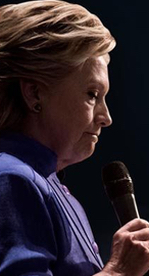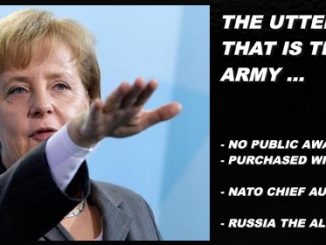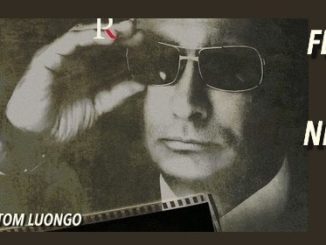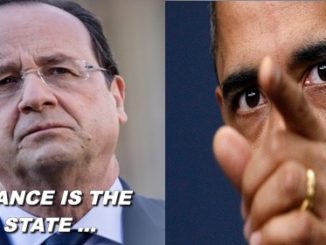
Trump on the Hamburg summit: startling realism on Putin and Russia
In interview with CBN News on the Hamburg summit President Trump speaks of Russia and its President Vladimir Putin with a respect and realism shown by scarcely any other leading US politician.
In the latest Crosstalk in which I appeared with Peter Lavelle, I made the point at the very end that much of the US’s anger towards Russia comes from a US belief that the US won the Cold War and that Russia refuses to behave like a defeated country by submitting to this ‘fact’.
I said that if there is to be any future to the US-Russia relationship, the US has to move beyond this.
I also said that much of the anger in the US towards Donald Trump is precisely because he has had the realism to move beyond it.
In President Trump’s just released interview with CBN News, there is one single statement that perhaps more than any other President Trump has made since he was elected US President perfectly sums up his realism about Russia
Well, he wants what’s good for Russia, and I want what’s good for the United States. And I think in a case like Syria where we can get together, do a ceasefire, and there are many other cases where getting along can be a very positive thing, but always Putin is going to want Russia and Trump is going to want the United States and that’s the way it is…..
Sometimes you’re not going to get along on things and sometimes you will. But we had a good meeting, it was a face-to-face meeting, it was a long meeting. People said, ‘Oh they shouldn’t get along.’ Well, who are the people that are saying that? I think we get along very, very well. We are a tremendously powerful nuclear power, and so are they. It doesn’t make sense not to have some kind of a relationship
(bold italics added)
President Trump is stating the obvious, and his words show that he is genuinely baffled that so many people resist it.
The problem is that these words – factually correct as they so obviously are – are ideological heresy for far too many people in the political system in the US.
To say that Russia is a powerful country like the US, to say that Russia has interests that may not correspond with those of the US, and to speak of President Putin promoting Russian interests in the same way as US interests are promoted by the US President, is to say something that would be judged all but treasonous by those in the US who feel that, after ‘losing’ the Cold War, Russia as a defeated country has no right either to be powerful or to have national interests in conflict with those of the US.
Contrast, for example, President Trump’s simple admission of the obvious – that Russia is a powerful country in some ways comparable to the US – with Barack Obama’s struggles to do so. Obama’s twisted language on this subject has been perfectly described for The Duran by Peter Lavelle:
Instead of accepting the west’s unilateral decision regarding Ukraine and shortly thereafter for Syria, Russia got an upgrade. Russia went from a marginal country to a
“regional power.” Recall the words of Barack Obama, “Russia is a regional power that is threatening some of its immediate neighbors — not out of strength but out of weakness.” This upgrade was not meant to be a compliment – it signalled the west’s “stability barometer” and “psychic test” had been activated. The evil Russians were back and a threat to the west’s “virtuous values” it must provide (using force if necessary) to the entire world.
As the West continued to stumble and bumble in the Middle East and Ukraine, as well as failing to cope with social unrest at home, the higher Russia profiled in the western mind. The endless and mindless mantra became: failed policies in the Middle East, Ukraine, and failing domestic policies is Russia’s fault, particularly Vladimir Putin’s fault. This warranted another update. Russia was no longer a “regional power,” it had become an “important” country. Recall Obama’s evolution: “The bottom line is, is that we think that Russia is a large important country with a military that is second only to ours, and has to be a part of the solution on the world stage, rather than part of the problem.” This can be read as a backhanded compliment.
 If Obama struggled to accept that “Russia is a large important country with a military that is second only to ours”, Hillary Clinton never even got that far, and almost certainly never will.
If Obama struggled to accept that “Russia is a large important country with a military that is second only to ours”, Hillary Clinton never even got that far, and almost certainly never will.
As for Putin simply being someone “who wants what’s good for Russia”, since neither Barack Obama nor Hillary Clinton accept that Russia has a right to have national interests or even opinions that differ from those of the US, that too is something that Barack Obama and Hillary Clinton would never say.
On the contrary, for Barack Obama the ‘problem’ is to ‘convert’ Russia so as to make it “part of the solution on the world stage, rather than part of the problem” – i.e.. Russia has somehow to be forced or ‘persuaded’ to accede to US demands so that it fits in – becomes “part of the solution” – to the US dominated world.
Hillary Clinton typically puts it more crudely: defending Russian national interests makes Putin into “Hitler”, whilst on the other side of the Democrat-Republican divide Senator McCain – the Republicans’ candidate to become US President in 2008 – speaks of Putin like this
There is no moral equivalence between that butcher and thug and KGB colonel and the United States of America. The country that Ronald Reagan used to call a shining city on a hill
In my numerous articles for The Duran concerning President Trump’s conduct of foreign policy, I have never held back from criticism. I have criticised President Trump for his handling of his meeting in Mar-a–Lago with Chinese President XI Jinping, for his conduct of the North Korean crisis, for his hasty reaction to the alleged chemical attack on Khan Sheikhoun and his attack on Syria’s Al-Shayrat air base, for his dangerous hostility to Iran, and for the way he has unwisely aligned the US with the reckless policies of Saudi Arabia’s maverick Crown Prince Mohammed bin Salman.
These, however, remain in my opinion mistakes of inexperience. In time, if he listens to advice and learns, President Trump can grow out of them.
By contrast, President Trump’s understanding of the fundamental geopolitical realities – of the reality of Russian and Chinese power and of the need for an equal dialogue in the US’s interests with the leaders of those countries – amongst US politicians today he stands almost alone.
That is the single most important reason why so many of them hate him, and are trying to destroy him, but it is also the single most important reason why, at this time when the world is becoming increasingly bipolar or even multipolar, he remains the best available President for the United States.
************
ER recommends other articles by The Duran
About the author
Alexander Mercouris is Editor-in-Chief at The Duran




